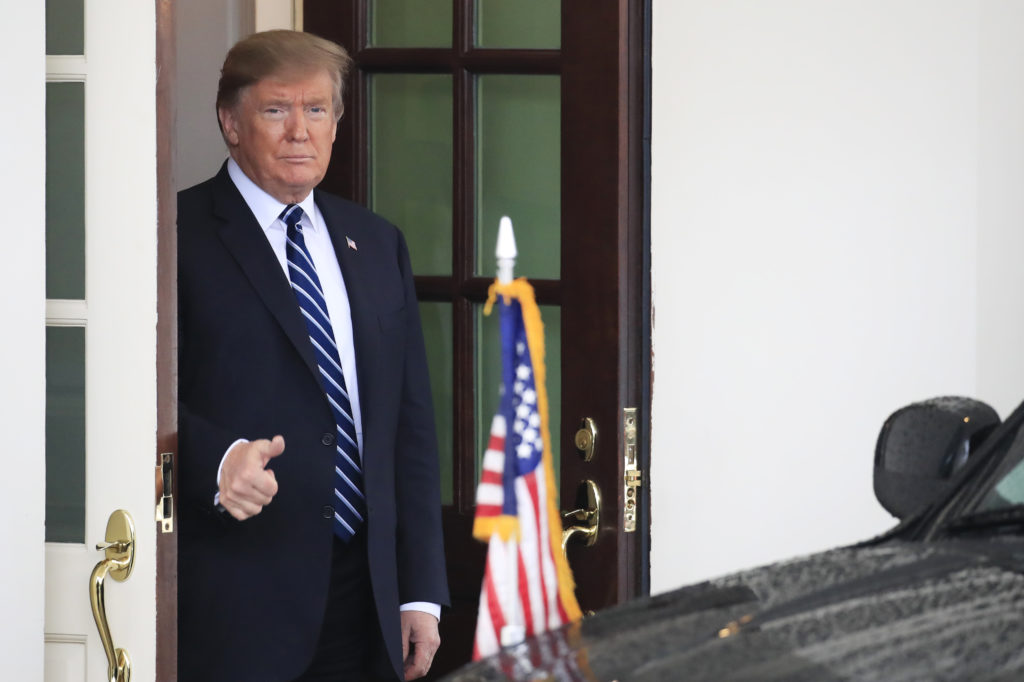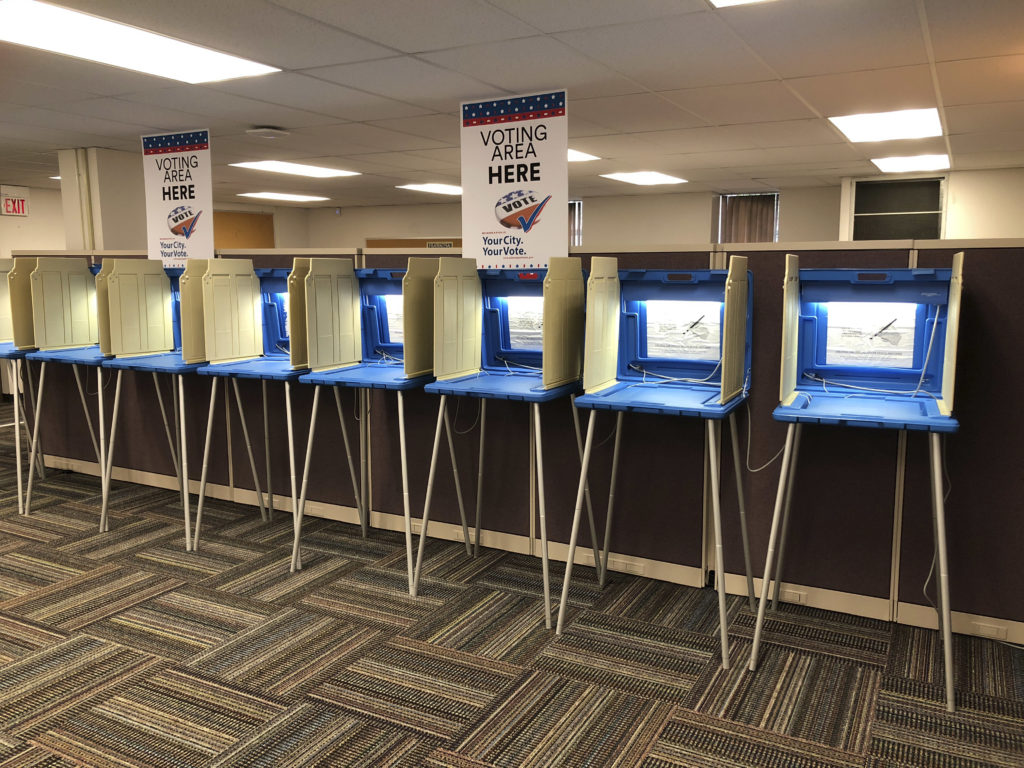Donald Trump ties U.S. success to 2nd term: ‘You have to vote for me’

President Donald Trump sought to reassure his supporters about the state of the U.S. economy despite the stock market volatility and told rallygoers in New Hampshire, a state that he hopes to capture in 2020, that their financial security depends on his reelection. “Whether you love me or hate me you have to vote for me,” Trump said. Speaking to a boisterous crowd at Southern New Hampshire University Arena, Trump dismissed the heightened fears about the U.S. economy and a 3 percent drop Wednesday in the Dow Jones Industrial Average, which was fueled by a slowing global economy and a development in the bond market that has predicted previous recessions. Avoiding an economic slump is critical to Trump’s reelection hopes. “The United States right now has the hottest economy anywhere in the world,” Trump said. Trump, who reached the White House by promising to bring about a historic economic boom, claimed, as he often does, that the markets would have crashed if he had lost his 2016 bid for the presidency. And he warned that if he is defeated in 2020, Americans’ 401(k) retirement accounts will go “down the tubes.” The Republican president also defended his tactics on trade with China. He has imposed 25 percent tariffs on $250 billion of imports from China and has threatened to hit the remaining $300 billion worth of Chinese imports with 10 percent tariffs. He has delayed that increase on about half of those items to avoid raising prices for U.S. holiday shoppers. He said China wants to make a trade deal with the U.S. because it’s costing the country millions of jobs, but he claimed that the U.S. doesn’t need to be in a hurry. “I don’t think we’re ready to make a deal,” Trump said. Trump’s rally was the first since mass shootings in El Paso, Texas, and Dayton, Ohio, killed 31 people and wounded dozens more. The shootings have reignited calls for Congress to take immediate action to reduce gun violence. Trump said the U.S. can’t make it more difficult for law-abiding citizens to protect themselves, but he advocated for expanding the number of facilities to house the mentally ill without saying how he would pay for it. “We will be taking mentally deranged and dangerous people off of the streets so we won’t have to worry so much about them,” Trump said. “We don’t have those institutions anymore, and people can’t get proper care. There are seriously ill people and they’re on the streets.” Along with discussion of the economy and guns, Trump hit a number of other topics, accusing the European Union of being “worse than China, just smaller”; bragging about his 2016 electoral victories in Wisconsin, Michigan and Pennsylvania; and calling it a “disgrace” that people were throwing water on police officers in New York. The rally was interrupted about a half an hour in by a handful of protesters near the rafters of the arena. As the protesters were being led out, a Trump supporter wearing a “Trump 2020” shirt near them began enthusiastically shaking his fist in a sign of support for the president. But Trump mistook him for one of the protesters and said to the crowd: “That guy’s got a serious weight problem. Go home. Start exercising. Get him out of here, please.”After a pause, he added, “Got a bigger problem than I do.” New Hampshire, which gave Trump his first GOP primary victory but favored Hillary Clinton in the 2016 general election, is doing well economically, at least when using broad measures. But beneath the top-line data are clear signs that the prosperity is being unevenly shared, and when the tumult of the Trump presidency is added to the mix, the state’s flinty voters may not be receptive to his appeals. An August University of New Hampshire Survey Center poll found that 42 percent of New Hampshire adults approve of Trump while 53 percent disapprove. The poll also showed that 49 percent approve of Trump’s handling of the economy and 44 percent disapprove. Some Democratic presidential campaigns are holding events to capitalize on Trump’s trip. Joe Biden’s campaign set up down the street from the arena to talk to voters and enlist volunteers. A group for Pete Buttigieg’s campaign gathered in nearby Concord to call voters about his support for new gun safety laws. And Cory Booker urged Trump to cancel the speech and instead order Congress to take immediate action to prevent gun violence. At 2.4 percent, New Hampshire’s seasonally adjusted unemployment rate for May was among the lowest in the nation. But wage growth is significantly below national gains. Average hourly earnings rose a scant 1 percent in New Hampshire in 2018, lagging the 3 percent gain nationwide, according to the Bureau of Labor Statistics. In other ways, like the home ownership rate — first in the nation — and median household income — seventh in the U.S. — the state is thriving, according to census data. New Hampshire’s four Electoral College votes are far below that of key swing states like Florida, Wisconsin and Michigan, but its influence can prove powerful in close election years like 2000, when George W. Bush’s victory in the state gave him the edge needed to win the White House. By Kevin Freking Associated Press AP Economics Writer Josh Boak and AP Polling Editor Emily Swanson in Washington and Associated Press writer Hunter Woodall in Manchester, N.H., contributed to this report. Republished with permission of the Associated Press.
Majority worry about 2020 meddling

A majority of Americans are concerned that a foreign government might interfere in some way in the 2020 presidential election, whether by tampering with election results, stealing information or by influencing candidates or voter opinion, a new poll shows. The poll from The Associated Press-NORC Center for Public Affairs Research finds Democrats far more likely to express the highest level of concern, but Democrats and Republicans alike have at least some concerns about interference. Overall, half of Americans say they’re extremely or very concerned about foreign interference in the form of altered election results or voting systems, even though hackers bent on causing widespread havoc at polling places face challenges in doing so. An additional quarter is somewhat concerned. Similarly, about half are very concerned by the prospect of foreign governments influencing political candidates or affecting voters’ perceptions of the candidates, along with hacking candidate computer systems to steal information. In total, the poll, conducted Thursday through Monday, shows 63 percent of Americans have major concerns about at least one of those types of foreign election interference, including 80 percent of Democrats and 46 percent of Republicans. The results make clear that despite the efforts of U.S. officials to ward off election interference and to urge public awareness and calm, Americans remain anxious that some of the same tactics Russia used to meddle in the 2016 presidential election could surface again in the next race. Those include the spread of disinformation online to sow divisions among American voters, and the hacking by military intelligence officers of Democratic emails that were then published by WikiLeaks in the run-up to the election. The efforts were aimed at helping Republican Donald Trump over Democratic rival Hillary Clinton, according to special counsel Robert Mueller’s report. “I think that it’s been pretty well-documented that people have been influenced in the past by social media,” said Luci Dvorak, 32, an Illinois teacher. She said she found it concerning that Trump has been “very casual” about getting foreign help and even seemed to invite it. Trump said in a television interview last week that he would be open to receiving a foreign government’s help in the next election. He slightly walked back those comments in a follow-up interview, saying that though he would want to look at foreign dirt on an opponent to assess if it was correct, he would “of course” also report it to the FBI or the attorney general. U.S. officials are on high alert to protect against interference like what occurred in 2016. FBI Director Chris Wray has said the bureau regards last November’s midterm elections as a “dress rehearsal for the big show in 2020.” He has said efforts to undermine democracy and influence public opinion through social media, propaganda and false personas have continued unabated and are “not just an election-cycle threat.” “We saw that, therefore, continue full speed in 2018, in the midterms,” Wray said in April at a Council on Foreign Relations event. “What we did not see in 2018 was any material impact or interference with election infrastructure or, you know, campaign infrastructure.” The decentralized nature of the country’s elections, which are run on a local level and rely on different and varied voting systems, would make it hard for hackers to cause widespread problems. But concerns remain: Russian hackers gained access to voter databases in two Florida counties ahead of the 2016 election. Federal officials are also conducting a forensic analysis of electronic poll books to see if Russian military hackers who targeted a software provider may have tampered with registration information to disrupt voting in a North Carolina county. The poll was conducted roughly two months after the release of special counsel Robert Mueller’s report on his investigation into potential coordination between the Trump campaign and Russia. That report did not establish a criminal conspiracy between Trump associates and the Kremlin to sway the outcome of the election. It did not reach a conclusion on whether the president had criminally obstructed justice, citing a Justice Department legal opinion that says sitting presidents cannot be indicted. Trump has repeatedly said the report found “no collusion” and claimed vindication in Attorney General William Barr’s announcement that he found Mueller’s evidence insufficient to establish an obstruction charge. The poll shows about half of Americans think the Mueller report did not completely clear Trump of obstruction, while many also think it didn’t clear him of coordinating with Russia. Overall, 48 percent said they think the report didn’t clear Trump of obstruction, while just 20 percent think it did. Another 30 percent say they don’t know enough to say. Many Americans — 44 percent — also think the report did not clear Trump of coordination with Russia, while 24 percent think it did and 31 percent aren’t sure. “It’s the twisting of the opposition party that’s given him all this static, where he’s not able to move or do what he’d like to do,” said 88-year-old Dennis Halaszynski, who is retired and lives in McKeesport, Pennsylvania. “They said at the beginning that he’s going to go to jail, and they’re doing their best to put him in jail,” he added. “He’s just not having the time, the proper time, to do what he’d like to do.” The AP-NORC poll of 1,116 adults was conducted June 13-17 using a sample drawn from NORC’s probability-based AmeriSpeak Panel, which is designed to be representative of the U.S. population. The margin of sampling error for all respondents is plus or minus 4.0 percentage points. Respondents were first selected randomly using address-based sampling methods, and later interviewed online or by phone. By Eric Tucker and Emily Swanson Associated Press. Republished with the permission of the Associated Press.


